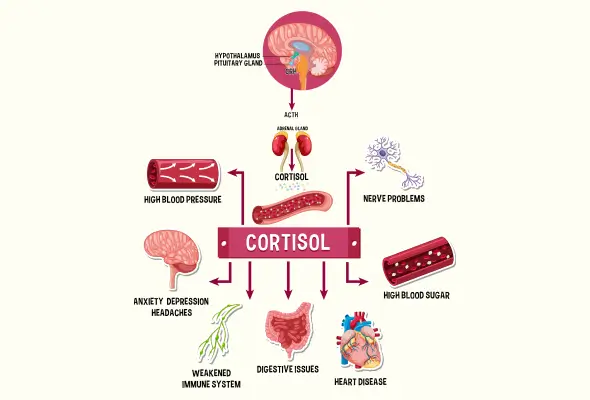-
Doctors
-
Specialities & Treatments
Centre of Excellence
Specialties
Treatments and Procedures
Hospitals & Directions HyderabadCARE Hospitals, Banjara Hills CARE Outpatient Centre, Banjara Hills CARE Hospitals, HITEC City CARE Hospitals, Nampally Gurunanak CARE Hospitals, Musheerabad CARE Hospitals Outpatient Centre, HITEC City CARE Hospitals, Malakpet
HyderabadCARE Hospitals, Banjara Hills CARE Outpatient Centre, Banjara Hills CARE Hospitals, HITEC City CARE Hospitals, Nampally Gurunanak CARE Hospitals, Musheerabad CARE Hospitals Outpatient Centre, HITEC City CARE Hospitals, Malakpet Raipur
Raipur
 Bhubaneswar
Bhubaneswar Visakhapatnam
Visakhapatnam
 Nagpur
Nagpur
 Indore
Indore
 Chh. Sambhajinagar
Chh. SambhajinagarClinics & Medical Centers
Book an AppointmentContact Us
Online Lab Reports
Book an Appointment
Consult Super-Specialist Doctors at CARE Hospitals

High Cortisol Levels in Females
Symptom, Causes, Diagnosis and Treatment
High Cortisol Levels in Females
Have you ever felt exhausted, anxious, or noticed unexplained weight gain? These could be symptoms of high cortisol levels in females. Cortisol, or stress hormone, is crucial in many bodily functions. However, when cortisol levels are high, it can impact a woman's health and wellness in various ways.
Let's understand the common signs of elevated cortisol in women and what they mean. We'll look at the causes of high cortisol, how doctors diagnose it, and ways to treat it.

What is Cortisol?
Cortisol is a steroid hormone vital for the human body. It's often referred to as the "stress hormone" because it helps regulate the body's response to stress. However, cortisol's functions extend far beyond stress management.
The adrenal glands, small triangle-shaped structures located on top of each kidney, produce and release cortisol. Cortisol affects nearly every organ and tissue in the body. It has an impact on metabolism, helping to control the body's use of fats, proteins, and carbohydrates. This hormone also suppresses inflammation, regulates blood sugar and blood pressure levels, and influences the sleep-wake cycle.
Cortisol hormone levels in the body follow a circadian rhythm, typically highest in the morning and lowest at night. This natural fluctuation helps regulate various bodily functions throughout the day.
It's important to note that while cortisol is essential for health, maintaining balanced levels is crucial. High and low cortisol levels can negatively affect a person's well-being, potentially leading to various symptoms and health issues.
High Cortisol Symptom in Females
High cortisol levels in females can significantly impact various aspects of their health. The following are the common signs of elevated cortisol in women:
- Physical Symptoms:
- Rapid weight gain, especially in the face, abdomen, and back of the neck
- The face might become round and red, sometimes called "moon face.
- Purple stretch marks on the stomach, hips, and breasts
- Thin, frail skin that bruises easily
- Slow wound healing
- Acne
- Muscle weakness, particularly in the upper arms & thighs
- High blood pressure
- Fatigue and weakness
- Emotional and Mental Symptoms:
- Depression and anxiety
- Irritability
- Mood swings
- Difficulty concentrating or remembering things
- Trouble sleeping
- Reproductive Health Issues:
- Irregular or stopped menstrual cycles
- Changes in libido
- Fertility problems
- Excessive hair on the face, neck, and other body parts, a condition known as hirsutism
It's important to note that these symptoms can vary from person to person and may not always indicate high cortisol levels.
Causes and Risk Factors of Elevated Cortisol Levels
- Chronic Stress: Long-term stress is a significant contributor to high cortisol levels in females. When you are constantly under pressure, your body's stress response system stays activated, leading to prolonged cortisol secretion. This may be due to a demanding workload, financial worries, or family responsibilities.
- Medical Conditions: Several medical conditions can cause elevated cortisol levels. This can be due to:
- Pituitary tumours producing excess adrenocorticotropic hormone (ACTH)
- Adrenal gland tumours or excessive growth of adrenal tissue
- Ectopic ACTH-producing tumours in other parts of the body
- Hyperpituitarism and certain types of cancer can also lead to high cortisol levels.
- Medications: Some medications can raise cortisol levels:
- Chronic use of glucocorticoid medications
- Other medicines that may affect cortisol levels include certain antidepressants and stimulants.
- Risk Factors: Several factors can increase the possibility of developing high cortisol levels:
- Being female (70% of Cushing's syndrome cases occur in women)
- Underlying medical conditions affecting the pituitary or adrenal glands
- Trauma
- Genetic predisposition (in rare cases)
Diagnosis
Diagnosing high cortisol levels in females involves a series of tests to measure cortisol in the body, such as:
- Cortisol Evaluation: A cortisol test is the primary method of assessing cortisol levels. Doctors can do this test through blood, urine, or saliva samples.
- 24-hour urinary cortisol test to measure cortisol output
- Midnight salivary cortisol test to check cortisol levels between 11 p.m. and 12 a.m. when they should typically be low.
- Blood tests measure cortisol and adrenocorticotropic hormone (ACTH) levels.
If initial tests show abnormal results, doctors may order additional investigations to confirm the diagnosis and identify the underlying cause. These may include:
- ACTH Stimulation Test: To assess how the adrenal glands respond to artificial ACTH.
- Dexamethasone Suppression Test: This measures cortisol levels after taking dexamethasone, a synthetic form of cortisol.
- Imaging tests: MRI or CT scans examine the pituitary and adrenal glands for tumours or other abnormalities.
Treatment
The treatment for high cortisol levels in females depends on the underlying cause. Doctors typically recommend a tailored approach based on the individual's specific condition and symptoms, including:
- For those using glucocorticoid medications, doctors may suggest lowering the dosage or switching to a non-glucocorticoid alternative.
- If a tumour is causing Cushing's syndrome, surgery or radiation therapy might be necessary. In some cases, both adrenal glands may need to be removed, a procedure known as bilateral adrenalectomy.
- Medications play a crucial role in managing cortisol levels when other high cortisol cures aren't suitable. Drugs like ketoconazole, osilodrostat, and mitotane can help control cortisol production. Mifepristone is approved explicitly for people with Cushing's syndrome who have high blood sugar or type 2 diabetes.
- It's important to note that after treatment, the body may temporarily produce insufficient cortisol. Cortisol replacement therapy may be necessary in such cases, sometimes for life.
- Alongside medical interventions, lifestyle changes can help manage cortisol levels. These include stress reduction techniques, regular exercise, and a healthy diet.
When to See a Doctor
If you're experiencing symptoms of high cortisol levels in females, it's crucial to consult a doctor. You should consult a doctor if you notice:
- Rapid weight gain, especially in the face, abdomen, and back of the neck
- Muscle weakness
- Easy bruising and slow wound healing
- Mood changes, including anxiety and depression
- Trouble sleeping or constant fatigue
- Irregular menstrual cycles or changes in libido
How can I reduce high cortisol levels?
Some ways that can lower cortisol levels naturally are:
- Reduce Stress: Setting priorities and avoiding unnecessary stressors can help manage stress levels. Practising relaxation techniques like breathing exercises, guided meditation, or yoga can trigger the body's relaxation response, countering the stress response.
- Dietary Changes: A balanced diet is crucial in managing cortisol levels. Increasing dietary fibre intake through vegetables, fruits, beans, and whole grains can be beneficial. Omega-3 fatty acids, found in fish & seafood, may also help. It's essential to be mindful of sugar and caffeine intake, especially in the evening, as they can interfere with sleep quality.
- Good Sleep: Getting enough sleep is vital for cortisol regulation. Maintaining a healthy and consistent sleep schedule and developing a good bedtime routine can improve sleep quality.
- Physical Activity: Regular exercise can reduce cortisol levels, but choosing low- or moderate-impact activities is essential to avoid triggering a stress response.
- Quit Smoking: Quitting cigarettes can have a positive impact on cortisol levels.
Conclusion
Understanding the impact of high cortisol levels in females is necessary for overall health and wellness. From physical changes like weight gain and muscle weakness to emotional symptoms such as anxiety and mood swings, elevated cortisol can have far-reaching effects on a woman's body and mind. Recognising these signs early and seeking medical advice can lead to timely diagnosis & treatment, potentially preventing more serious health issues down the line. Managing cortisol levels often involves a mix of medical interventions and lifestyle changes. Remember, each person's situation is unique, so working closely with doctors to create a personalised plan is essential.
FAQs
1. Is cortisol a stress hormone?
Yes, cortisol is often referred to as the 'stress hormone'. It creates the body's stress response. When you face a stressful situation, the body releases cortisol to help you deal with the threat.
2. What does high cortisol do to my body?
High cortisol levels lead to weight gain, especially around the midsection and upper back, cause acne, thin your skin, and make you bruise easily. You might also experience muscle weakness, severe fatigue, irritability, and difficulty concentrating. High cortisol can also increase blood pressure & blood sugar levels.
3. How does my body control cortisol levels?
Your body controls cortisol levels through a complex system consisting of the hypothalamus, pituitary gland, and adrenal glands. This complex system is known as the hypothalamic-pituitary-adrenal axis. When cortisol levels are low, the hypothalamus signals the pituitary gland to secrete a hormone responsible for boosting the synthesis of cortisol by adrenal glands.
4. What causes cortisol to rise?
Several factors can cause cortisol levels to rise. These may include chronic stress, certain medical conditions (such as Cushing's syndrome), and some medications, particularly corticosteroids.
5. How do I know if I have high cortisol?
If you're experiencing symptoms of high cortisol levels, such as rapid weight gain, muscle weakness, mood swings, or trouble sleeping, they may be warning signs of high cortisol levels.
6. What causes low levels of cortisol?
Low cortisol levels, known as adrenal insufficiency, can be caused by problems with the adrenal glands (Addison's disease) or issues with the pituitary gland. It can also occur after stopping long-term corticosteroid treatment too quickly. Symptoms of low cortisol may include fatigue, weight loss, low blood pressure, and darkening of the skin.
Still Have a Question?




